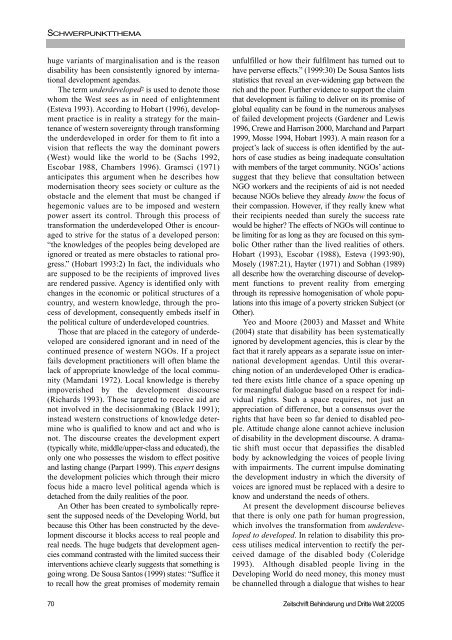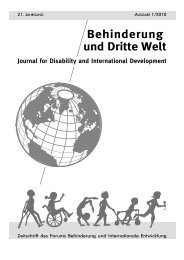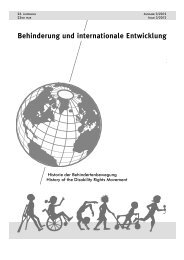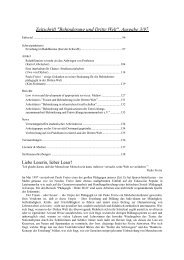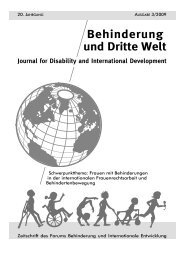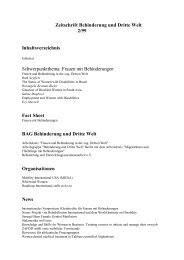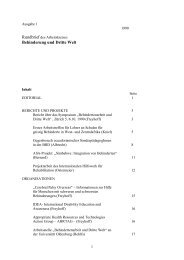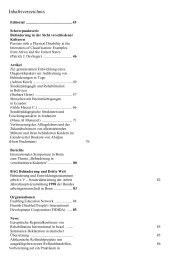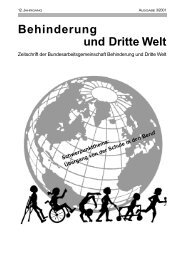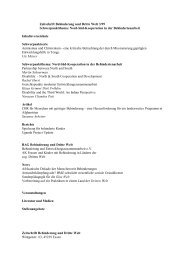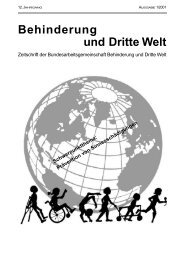Armut und Behinderung - Behinderung und Dritte Welt
Armut und Behinderung - Behinderung und Dritte Welt
Armut und Behinderung - Behinderung und Dritte Welt
You also want an ePaper? Increase the reach of your titles
YUMPU automatically turns print PDFs into web optimized ePapers that Google loves.
SCHWERPUNKTTHEMAhuge variants of marginalisation and is the reasondisability has been consistently ignored by internationaldevelopment agendas.The term <strong>und</strong>erdeveloped 2 is used to denote thosewhom the West sees as in need of enlightenment(Esteva 1993). According to Hobart (1996), developmentpractice is in reality a strategy for the maintenanceof western sovereignty through transformingthe <strong>und</strong>erdeveloped in order for them to fit into avision that reflects the way the dominant powers(West) would like the world to be (Sachs 1992,Escobar 1988, Chambers 1996). Gramsci (1971)anticipates this argument when he describes howmodernisation theory sees society or culture as theobstacle and the element that must be changed ifhegemonic values are to be imposed and westernpower assert its control. Through this process oftransformation the <strong>und</strong>erdeveloped Other is encouragedto strive for the status of a developed person:“the knowledges of the peoples being developed areignored or treated as mere obstacles to rational progress.”(Hobart 1993:2) In fact, the individuals whoare supposed to be the recipients of improved livesare rendered passive. Agency is identified only withchanges in the economic or political structures of acountry, and western knowledge, through the processof development, consequently embeds itself inthe political culture of <strong>und</strong>erdeveloped countries.Those that are placed in the category of <strong>und</strong>erdevelopedare considered ignorant and in need of thecontinued presence of western NGOs. If a projectfails development practitioners will often blame thelack of appropriate knowledge of the local community(Mamdani 1972). Local knowledge is therebyimpoverished by the development discourse(Richards 1993). Those targeted to receive aid arenot involved in the decisionmaking (Black 1991);instead western constructions of knowledge determinewho is qualified to know and act and who isnot. The discourse creates the development expert(typically white, middle/upper-class and educated), theonly one who possesses the wisdom to effect positiveand lasting change (Parpart 1999). This expert designsthe development policies which through their microfocus hide a macro level political agenda which isdetached from the daily realities of the poor.An Other has been created to symbolically representthe supposed needs of the Developing World, butbecause this Other has been constructed by the developmentdiscourse it blocks access to real people andreal needs. The huge budgets that development agenciescommand contrasted with the limited success theirinterventions achieve clearly suggests that something isgoing wrong. De Sousa Santos (1999) states: “Suffice itto recall how the great promises of modernity remain70unfulfilled or how their fulfilment has turned out tohave perverse effects.” (1999:30) De Sousa Santos listsstatistics that reveal an ever-widening gap between therich and the poor. Further evidence to support the claimthat development is failing to deliver on its promise ofglobal equality can be fo<strong>und</strong> in the numerous analysesof failed development projects (Gardener and Lewis1996, Crewe and Harrison 2000, Marchand and Parpart1999, Mosse 1994, Hobart 1993). A main reason for aproject’s lack of success is often identified by the authorsof case studies as being inadequate consultationwith members of the target community. NGOs’ actionssuggest that they believe that consultation betweenNGO workers and the recipients of aid is not neededbecause NGOs believe they already know the focus oftheir compassion. However, if they really knew whattheir recipients needed than surely the success ratewould be higher? The effects of NGOs will continue tobe limiting for as long as they are focused on this symbolicOther rather than the lived realities of others.Hobart (1993), Escobar (1988), Esteva (1993:90),Mosely (1987:21), Hayter (1971) and Sobhan (1989)all describe how the overarching discourse of developmentfunctions to prevent reality from emergingthrough its repressive homogenisation of whole populationsinto this image of a poverty stricken Subject (orOther).Yeo and Moore (2003) and Masset and White(2004) state that disability has been systematicallyignored by development agencies, this is clear by thefact that it rarely appears as a separate issue on internationaldevelopment agendas. Until this overarchingnotion of an <strong>und</strong>erdeveloped Other is eradicatedthere exists little chance of a space opening upfor meaningful dialogue based on a respect for individualrights. Such a space requires, not just anappreciation of difference, but a consensus over therights that have been so far denied to disabled people.Attitude change alone cannot achieve inclusionof disability in the development discourse. A dramaticshift must occur that depassifies the disabledbody by acknowledging the voices of people livingwith impairments. The current impulse dominatingthe development industry in which the diversity ofvoices are ignored must be replaced with a desire toknow and <strong>und</strong>erstand the needs of others.At present the development discourse believesthat there is only one path for human progression,which involves the transformation from <strong>und</strong>erdevelopedto developed. In relation to disability this processutilises medical intervention to rectify the perceiveddamage of the disabled body (Coleridge1993). Although disabled people living in theDeveloping World do need money, this money mustbe channelled through a dialogue that wishes to hearZeitschrift <strong>Behinderung</strong> <strong>und</strong> <strong>Dritte</strong> <strong>Welt</strong> 2/2005


